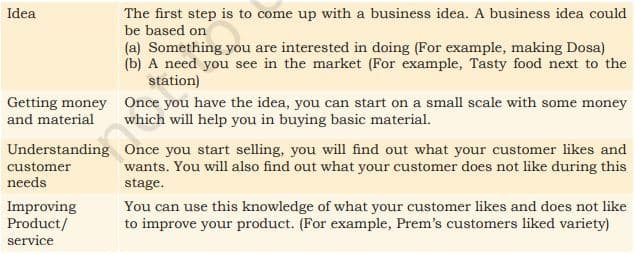Teachers and Examiners collaborated to create the Entrepreneurial Skills Class 9 Notes. All the important Information are taken from the CBSE Textbook Employability Skills Class IX Based on CBSE Pattern.

Entrepreneurial Skills Class 9 Notes
Session 1: What is Entrepreneurship
Who is entrepreneur?
An entrepreneur is a person who is self-employed, is willing to take a calculated risk and brings in a new idea to start a business. All self-employed persons are not called an entrepreneur, for example, a shopkeeper cannot be called an entrepreneur unless he/she implements an innovative method or concept into their business.
What is entrepreneurship?
The process of developing a business plan, launching and running a business using innovation to meet customer needs and to make a profit is entrepreneurship.
What is Enterprise?
An enterprise is a project or undertaking that is bold and fulfills a need of the society which no one has ever addressed. This business is started and run by an entrepreneur.
Session 2: Role of entrepreneurship
Role of entrepreneurship
- Economic Development (Money in Circulation) – As entrepreneurs grow their businesses, invest the money into the businesses, and expect good returns.
- Social Development (Creation of Jobs) – If the business grows, then more work will be there, which creates more jobs.
- Improved Standard of Living (More things available to live a comfortable life) – When entrepreneurs sell products like a mobile phone or a mobile service, it will help people have a comfortable life.
- Optimal Use of Resources – Entrepreneurs find the most optimal ways of using the resources to reduce costs and increase the profits.
Session 3: Qualities of a successful entrepreneur
Qualities of a successful entrepreneur are:
- Patience – Success may not be achieved quickly, so it is important that an entrepreneur be patient in running their business.
- Positivity – An entrepreneur has to think positively even when he/she takes a big risk.
- Hardworking, Never Giving Up and Perseverance – An entrepreneur never gives up; they need to work hard and try to make the business successful.
- Confidence – An entrepreneur needs to be very confident and take decisions about their business.
- Open to Trial and Error – Entrepreneurs have to use trial and error with different innovative ideas to make the business successful.
- Creativity and Innovation – An entrepreneur should be able to identify the problem and come up with original and creative solutions.
Session 4: Distinguishing characteristics of Entrepreneurship and wage employment
Characteristics of Entrepreneurship
Some of the distinguishing characteristics of entrepreneurship:
- Ability to take up risks
- Believe in hard work and discipline
- Adaptable and flexible to achieve the goals of enhancing quality and customer satisfaction
- Knowledge of the product and services and their need or demand in the market
- Money management skills and financial literacy
- Effective planning and execution.
What is wage Employment?
Wage employment is a paid job where an employee agrees to work for an employer. There are two parties in the wage employment; one is known as the employer, and the other is known as the employee. The employee (wage employment) does not involve too much risk, but the employer (entrepreneurship) involves taking a certain number of calculated risks in the business.
Benefits of entrepreneurship
The various benefits include the following:
- Do what you are interested in: Using your interests and abilities, entrepreneurship allows you to start doing something you like using your skills and hobbies.
- Work for yourself, and not for others: You can work for yourself as an entrepreneur, not for someone else. You can decide the work you like to do or not.
- Make profits for yourself: As an entrepreneur, it depends on the entrepreneur how much money you want to earn and how you want to earn it.
- More risk, more profit: Depending on the risks involved, entrepreneurship gives you the freedom to choose how much risk you are willing to take.
Session 5: Types of Business Activities
Types of business activities
There are three types of business activities:
- Product business – Product-based businesses are those in which a customer and seller trade tangible goods. For example, a sports store.
- Service business – a company where the seller helps a customer in completing tasks. For example, a cricket coaching center.
- Hybrid business – A hybrid business is one that offers both services and products for sale. For example, rahul opened a sports academy for coaching and selling sports equipment.
Session 6: Product, Service and Hybrid business
The key differences between product and service are:
| Product Business | Service Business |
|---|---|
| Product can be seen and touched. | Service cannot be seen or touched. |
| A product can be made and stored in a shop or a warehouse (usually). | A service, for example, cutting hair, cannot be stored. Service is provided when a customer asks for it. |
| A product can be either made at home or in a factory. | A service cannot be made or transported. |
| The quality and quantity of the product will be the same every time. | The quality and quantity of a service can be different at different times. |
Types of product-based business:
There are two types of product-based businesses:
- Manufacturing businesses – These are the businesses that make a product and sell it.
- Trade businesses – These businesses buy and sell a product. They also transport the product from the factory to warehouses and then finally to shops near the customers.
Session 7: Entrepreneurship Development Process
The process of enhancing entrepreneurs’ abilities and expertise is known as entrepreneurship development.
Steps of starting a business

Employability Skills Class 9 Notes
- Communication Skills Class 9 Notes
- Self Management Skills Class 9 Notes
- Basic ICT Skills Class 9 Notes
- Entrepreneurial Skills Class 9 Notes
- Green Skills Class 9 Notes
Employability Skills Class 9 MCQ
- Communication Skills Class 9 MCQ
- Self Management Skills Class 9 MCQ
- Basic ICT Skills Class 9 MCQ
- Entrepreneurship Skills Class 9 MCQ
- Green Skills Class 9 MCQ
Employability Skills Class 9 Questions and Answer
- Communication Skills Class 9 Questions and Answers
- Self Management Skills Class 9 Questions and Answers
- Basic ICT Skills Class 9 Questions and Answers
- Entrepreneurial Skills Class 9 Questions and Answers
- Green Skills Class 9 Questions and Answers
Disclaimer: We have taken an effort to provide you with the accurate handout of “Entrepreneurial Skills Class 9 Notes“. If you feel that there is any error or mistake, please contact me at anuraganand2017@gmail.com. The above CBSE study material present on our websites is for education purpose, not our copyrights. All the above content and Screenshot are taken from Employability Skills Class 9 CBSE Textbook and Support Material which is present in CBSEACADEMIC website, This Textbook and Support Material are legally copyright by Central Board of Secondary Education. We are only providing a medium and helping the students to improve the performances in the examination.
For more information, refer to the official CBSE textbooks available at cbseacademic.nic.in

One of the best notes for All subject ready to read ,easy to access,and very well organized. 🔮🔮🔮🔮🔮🔮🔮
best of the best notes given i have scored 49/50
thanks…… i scored 48/50
THIS IS A LIFE SAVER, 40 PAGE OF BOOK IN JUST 2 SLIdES!
beautifully explained very short thank you 😊
Very very useful this notes
THIS IS VERY good
GOOD
good helpful website
very good
Very nice notes I score 100/98
Very helpful and good for exam time and easy for learning. I score 40/49.5
Thank you so much 😊🙏
Nice notes I’ll score 40/38💖💖💖💖
good material for studying before exams.Thankyou
very very thank uuuuuuuuuuuuuuuuuu
Very helpful 🙂
Good notes
Thank you. This is really very helpful ☺️
really very helpful. it provides us with short,crisp notes
VERY NICE 😀